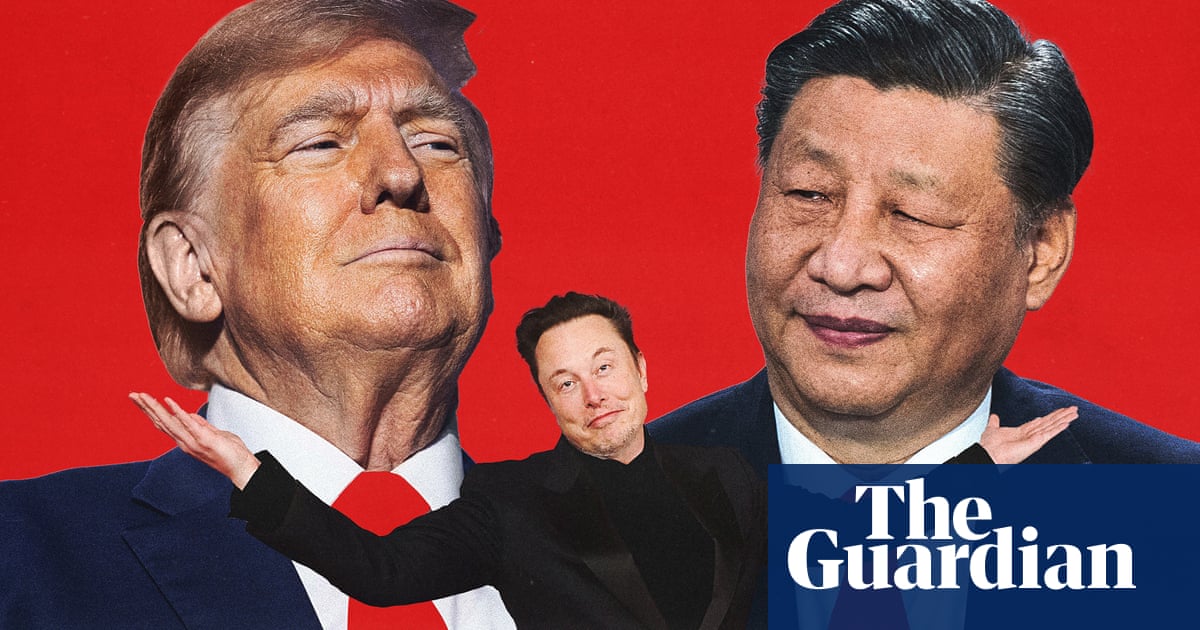If it pays to have friends in high places, few among us can claim to be better placed than Elon Musk, the world’s richest man and one of the only people to have cosy relationships with both Donald Trump and Xi Jinping. His commercial and political connections to both may prove pivotal as the feud between the US and China plays out over the next four years, particularly as Trump promises steep tariffs.
Musk, the billionaire CEO of Tesla and SpaceX, once supported Joe Biden. But his relationship with the current US president soured over the past four years as, among other insults, Musk felt that the White House gave Telsa, his car and green energy company, “the cold shoulder”. Trump, meanwhile, has described Tesla as “incredible” even while pledging to do away with subsidies for electric vehicles. This year, Musk formally endorsed Trump as the presidential candidate, campaigned for him online and off and donated more than $100m to his re-election effort.
Musk’s loyalty has been rewarded with his appointment as the leader of a newly created Department of Government Efficiency (Doge), which, despite its name, will be an advisory body, not a government agency. But perhaps more important for the global economy than his official role will be the influence he has on the dynamic between the leaders of the world’s two superpowers. With a trade war that was started by Trump and expanded by Biden, and mounting geopolitical tensions, the US-China relationship has been tumbling downhill for years, with negative global consequences, not least for consumers in the US and China, who have seen prices rise as a result.
Unlike the other figures in Trump’s newly appointed cabinet, such as China hawk Senator Marco Rubio, Trump’s pick for secretary of state who has been hit with sanctions by Beijing, Musk has a cosy relationship with China’s top leaders.
Musk has visited China several times, most recently in April, when he made a surprise trip to Beijing to convene with the Chinese premier Li Qiang. Last year, he met the Chinese president, Xi Jinping, in San Francisco.
Musk’s relationship with Li, the second-highest ranking person in China, is especially close: Li was the party secretary for Shanghai in 2019, when Tesla opened its first overseas factory there, which is now Tesla’s biggest factory by output. It was built with loans of $521m from Chinese-state owned banks, which were issued at favourable interest rates. The Shanghai government gave Tesla a beneficial corporate tax rate of 15% between 2019 and 2023, lower than the standard 25%. Tesla also reportedly managed to become the first foreign auto company to be allowed to set up without a local partner.
And construction has now started on a second $200m Tesla factory in Shanghai, which is expected to produce around 10,000 utility-scale lithium-ion batteries, called Megapacks, per year. Lithium batteries are one of China’s “new three” priority industries as Xi tries to pivot the economy towards high-tech, renewable infrastructure. The other two priority areas – EVs and solar panels – are also both Tesla products, though to a lesser extent regarding solar panels.
With large investments in two out of three of China’s economic priorities, Musk has been welcomed to the country with open arms. Reporting on the new battery factory in Shanghai, Chinese state media said: “Despite the US intensifying its crackdown on China’s new energy vehicle (NEV) sector, Tesla has chosen to further invest in China. This highlights industry leaders’ robust confidence in China’s high-tech advancement”.
Musk is vocal about his support for the country – and its government – that many in Washington see as the US’s biggest threat. He has described China as “truly amazing” and tweeted his gratitude to the Chinese government for supporting Tesla’s business in China. The country accounts for around one-quarter of Tesla’s global revenues, and the lion’s share of vehicle manufacturing capacity. The Shanghai factory has the capacity to make more than 950,000 cars a year, compared with more than 650,000 from the California plant.
Leaders in China may therefore want to leverage their support for Tesla into concessions from the new Trump administration, via Musk.
Trump has promised to introduce 60% tariffs on all Chinese imports, eliciting ire from Beijing and exacerbating an already fractious relationship. Levies on Chinese electric vehicles are already 100%, something which Musk has criticised, while at the same time warning that Tesla will be “demolished” if not financially protected from the likes of BYD.
Trump has pledged that US tariffs on Chinese EVs will to protect US carmakers. But the integrated nature of the EV supply chain, and China’s advanced position when it comes to battery technologies and the raw materials needed for EVs, means that few companies, including Tesla, can eliminate the need for Chinese parts in their products. For example, in October, following the latest round of US tariffs, which increased the levy on Chinese lithium-ion EV batteries from 7.5% to 25%, Tesla’s Model 3 car became unavailable for sales in the US. The car uses batteries made by the Chinese company CATL.
Daniel Ives, the global head of technology research at Wedbush Securities, a financial services firm, predicts that Musk will use his “bromance” with Trump to negotiate beneficial terms for Tesla and its interests in China, such as a exemptions for Tesla and other EV companies on batteries. Those negotiations may extend as far as tempering Trump’s trade war with China. “To have [Musk] there, it offsets a little of the hawkishness from Rubio and others,” Ives said.
“I think there are going to be carve-outs for Tesla when it comes to tariffs, as well for China,” Ives said. “That’s why Musk being a big part of the Trump presidency is so important”.
Additional research by Jasper Jolly
